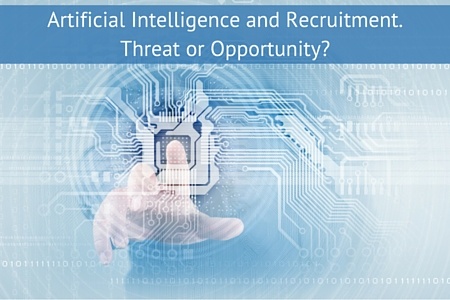

There has been a lot of press coverage over the summer about robots and more generally Artificial Intelligence (AI) taking over the world of work. BBC news has recently run a special feature on it which included an interactive test to check if your job is at risk (Will a robot take your job?).
What is AI and how will it affect recruitment specifically?
Artificial Intelligence is the science of how to make machines that can think for themselves according to Stanford University. Increasingly, machines have been able to learn and improve their own performance, producing results until recently only thought possible using human intelligence and social experience. It is this achievement which has thrust AI as a concept back into the mainstream press along with all the sensational headlines.
AI as a concept is not new. Computer scientist Alan Turing, famous for breaking the Enigma Code, wrote a paper speculating about a thinking machine in 1950 and the term “artificial intelligence” was coined in 1956 by Prof John McCarthy at a gathering of scientists at the Dartmouth Conference in that year.
Will a robot take over recruitment?
Probably not, according the research, but it is clear that the answer is much more complicated than that. Roles requiring people to think on their feet and come up with creative and original ideas, or occupations involving tasks that require a high degree of social intelligence and negotiating skills are considerably less at risk from machines.
Recruitment as a profession is therefore not directly at risk but even if recruitment requires skills that AI would find difficult to replicate, other roles may well cease to exist due to automation, so there will be no jobs to recruit for anyway.
In the UK, a report by Deloitte estimated that in the next twenty years low paid, unskilled and repetitive jobs are five times more likely to be taken over by AI algorithms than high skilled, well paid jobs.
Angus Knowles-Cutler, London senior partner at Deloitte, said in the report: “Technological advances are likely to cause a major shift in the UK labour market in the coming decades, creating both challenges and opportunities. Unless these changes coming in the next two decades are fully understood and anticipated by businesses, policy makers and educators, there will be a risk of avoidable unemployment and under-employment. A widening gap between ‘haves’ and ‘have nots’ is also a risk as lower skill jobs continue to disappear.”
The changing world of work
Automation and technological advances in general are changing the world of work on a continual basis and AI is perhaps the next step in that change. Technical advances don’t just destroy jobs, but can also create jobs in entirely new occupations and industries. There has been speculation that current undergraduates are preparing for a world of work where the job they will end up doing doesn’t yet exist. Who had heard of a Digital Risk Officer or a Social Media Analyst ten years ago? For the recruiter, it is more a matter of adaptation rather than extinction as some roles vanish, new ones will appear in their place.
Going it alone
Digital technologies have made self-employment an option for a growing number of workers particularly those that faced redundancy from technology innovations, and in this area perhaps, the role of recruiter is under threat, at least temporarily. For example, the “app economy” now provides work for more than 750,000 Americans in just 8 years since Apple first launched its App store and there are now 1.4 million apps available.
Entrepreneurs may not need the services of a recruitment consultant or an HR department in the beginning, but as soon as the company grows and needs a good supply of ever scarcer skilled and talented workers, the role of recruitment is once again at the forefront of each new and developing industry.
The digital age is set to cause more upheaval than previous technological revolutions simply because change is happening faster than ever before and is fundamentally altering the way we live and work. You only have to look at the table below to appreciate just how fast that change is occurring:
| Time to reach 50 million users: Telephone 75 years Radio 38 years TV 13 years Internet 4 years Facebook 3.5 years Angry Birds 35 Days |
Preparing for change
So, perhaps this technological revolution is the same as any other, albeit moving at a greater speed but still entailing the same risks and opportunities. By understanding the challenges, the risks can be mitigated, and by taking advantage of the opportunities, the benefits can be maximised for the world of recruitment and for everyone.
“The fundamental impulse that sets and keeps the capitalist engine in motion comes from the new consumers’ goods, the new methods of production or transportation, the new markets… [This process] incessantly revolutionises the economic structure from within, incessantly destroying the old one, incessantly creating a new one. This process of creative destruction is the essential fact about capitalism.” Schumpeter (1942)
At Chapple we specialize in sourcing candidates in external and internal communications, employee engagement, change and business transformation roles.
Contact us on 020 7734 8209 for more information about how we can help you find your next role or indeed find the right people for your business.